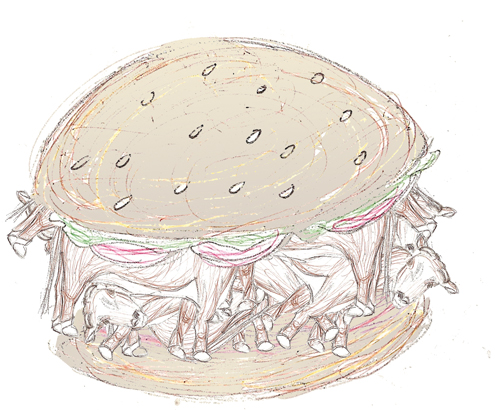Dining halls should step up sustainability

By Leigh Goodrich
Nov. 12, 2009 9:13 p.m.
If you ask students where their food comes from, most can trace their meals only as far back as the Bruin Cafe countertop or the dining hall serving stations. Like most people in the country, we can’t see where any of our food really comes from. Lately, this has started to worry me.
I recently watched the film “Food, Inc.,” a documentary on the food industry and its many flaws. It seems that questions about food safety are on the forefront of media coverage, with The New York Times extensively covering E. coli contamination in beef products just a few weeks ago. Similarly, books like Michael Pollan’s “The Omnivore’s Dilemma” or Jonathan Safran Foer’s new “Eating Animals” are best sellers.
As the curtain is lifted from the secretive industry producing our meals, there has been a growing movement toward organic, sustainable and locally grown foods. Buying from local food producers ensures quality because there is accountability, as opposed to anonymous large-scale manufacturers. More and more, people want to be able to see where their food comes from, and this just isn’t possible if it’s grown halfway around the world.
UCLA dining options need to reflect this movement, and recognize the realities of mass-produced food.
In The New York Times’ article about beef production, the conditions of meat-grinding factories is described in detail, including hamburger patties on the factory floor and dirty metal grinding machines.
These images are reminiscent of Upton Sinclair’s “The Jungle” or Eric Schlosser’s “Fast Food Nation.” Ground beef, in particular, is one of the more dangerous products, as slaughterhouse testing for E. coli is insufficient, and cattle coming into plants are often covered in their own feces.
Reading about the child who died within days of eating a tainted burger, or the woman who is now paralyzed from E. coli bacteria, really makes me lose my appetite. The more I learn about food safety, whether in the newspaper or in class, the more reassurance I want that my next meal won’t kill me. As college students become more informed and aware of these issues, they will demand a higher standard of food quality as well.
Though I’m not suggesting that the Bruin Burgers served in the dining halls are infested with deadly bacteria, I am curious about the origins of their meat. Most likely, the hamburger patties are an amalgam of different cuts of meat from different cows, from different parts of the country, ground together, processed, packaged and shipped. This is the standard process for beef production, in an industry where four manufacturing giants control about 80 percent of the market.
Knowing this, the information given to students about their food seems inadequate. On the menu listings for the dining halls, a Bruin cheeseburger is listed with the first ingredient as beef. There is no description of where this beef comes from, what producer has made it or what cuts of meat have been used. The unknown origins of the beef make it the equivalent of cafeteria mystery meat.
Our dining halls should have better standards than this. Dining Services has already made a lot of steps in the right direction. The Hedrick dining hall has an organic salad bar, and all of the dining halls have stopped serving beef on Thursdays. The efforts for sustainability, however, are more related to environmental issues than student health. Trayless programs at Hedrick and Rieber halls save water, while biodegradable to-go containers reduce waste.
According to the College Sustainability Report Card Web site, UCLA does not purchase cage-free eggs, grass-fed animal products, hormone- and antibiotic-free meat or dairy products. Although a University of California-wide goal is to make 20 percent of food offered sustainable by 2020, the definition of sustainable is lenient. The UC system considers local food to be as far as 500 miles away, and a mere 1 percent of the food served in UCLA dining halls and campus eateries is currently organic.
One might argue that the task of bringing organic, local and ultimately safe food to such a large school is impossible. However, universities across the country are overshadowing UCLA in their progress toward sustainable dining.
UC Berkeley already has certified organic dining halls, and schools like Yale University, Duke University, University of Washington, and California State University, Chico have been recognized for their wide variety of organic, locally grown and pesticide-free options. Though change cannot happen overnight, UCLA should take on more ambitious goals so it can be as proud of what fills students’ stomachs as what fills their minds.
If you’ve resorted to growing organic lettuce in a planter box in your dorm room, e-mail Goodrich at [email protected]. Send general comments to [email protected].


